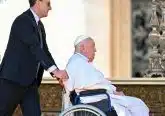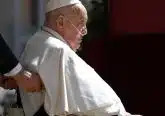Pope Francis issues law reorganizing Vatican finances
Vatican City, Dec 28, 2020 / 05:10 am MT (CNA).- Pope Francis issued a new law Monday reorganizing Vatican finances following a series of scandals.
In a document issued Dec. 28, the pope formalized the transfer of financial responsibilities from the Vatican’s Secretariat of State to the Administration of the Patrimony of the Apostolic See (APSA), which functions as the Holy See’s treasury and sovereign wealth manager.
He first announced the shake-up in an Aug. 25 letter to Vatican Secretary of State Cardinal Pietro Parolin that was made public on Nov. 5 after the Secretariat of State was engulfed by accusations of financial mismanagement.
The pope promulgated the new law in an apostolic letter issued motu proprio (“on his own impulse”).
The text, entitled “A better organization,” also set out new regulations for the oversight of Peter’s Pence, an annual worldwide collection supporting the pope’s mission.
Vatican officials have been forced to deny that money raised for Peter’s Pence was used to cover losses on a controversial London property deal overseen by the Secretariat of State.
The document, signed Dec. 26 and coming into force before the start of the Vatican’s new fiscal year, contains four articles. The first concerns the transfer of investments and liquidity from the Secretariat of State to APSA. The second regulates the management of papal funds. The third sets out “provisions on economic and financial monitoring and supervision” and the fourth addresses the functioning of the Secretariat of State’s administrative office.
Under the new law, APSA will gain ownership of funds, bank accounts, and investments, including real estate, previously administered by the Secretariat of State from Jan. 1, 2021.
APSA’s management of its new responsibilities will be subject to “ad hoc control” by the Vatican’s Secretariat for the Economy, established in 2014 to oversee the financial activities of the Holy See and Vatican City State. The Secretariat for the Economy will in future also serve as the Papal Secretariat for Economic and Financial Matters.
The law requires the Secretariat of State to “transfer as soon as possible, and no later than Feb. 4, 2021,” all of its liquid assets held in current accounts at the Institute for the Works of Religion, commonly known as the “Vatican bank,” and foreign banks.
The law asks APSA to create a budgetary provision called “Papal Funds” which will be included in the Holy See’s consolidated financial statements. It will contain a sub-account called “Peter’s Pence.” Another sub-account, called the “Holy Father’s Discretionary Fund,” will be operated solely at the pope’s direction. A third sub-account, known as “Entitled Funds,” will be set up for funds that “have a particular restriction of destination by the will of the donors or by regulatory provision.”
The motu proprio gives the Secretariat for the Economy, led first by Cardinal George Pell and now by Fr. Juan Antonio Guerrero Alves, S.J., supervisory powers over entities previously overseen by the Secretariat of State. Various Vatican entities will transmit their budget and final balance sheets to the Secretariat for the Economy, which will then pass them for approval to the Council for the Economy, founded in 2014.
The text also says that the Secretariat of State’s administrative office should maintain “exclusively the human resources necessary to carry out the activities related to its internal administration, preparation of its budget and balance sheet and other non-administrative functions performed so far,” and transfer relevant archive material to APSA.
The Holy See press office said Dec. 28 that the motu proprio converts into law the decisions set out in the pope’s August letter to Parolin, which led to the creation of a commission overseeing the transfer of responsibilities from the Secretariat of State to APSA. The press office explained that the commission would “continue to clarify some technical details until Feb. 4, as was expected.”
“This new law reduces the number of economic managers in the Holy See and concentrates administration, management, and economic and financial decisions in the dicasteries that correspond to the purpose,” the press office said.
“With it, the Holy Father wishes to proceed to a better organization of the Roman Curia and to an even more specialized functioning of the Secretariat of State, which will be able with greater freedom to help him and his successors in matters of greater importance for the good of the Church.”
It added that the motu proprio also “establishes a greater control and a better visibility of Peter’s Pence and of the funds that proceed from the donations of the faithful.”













